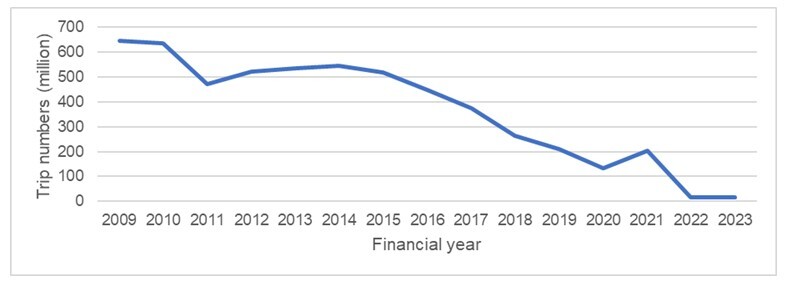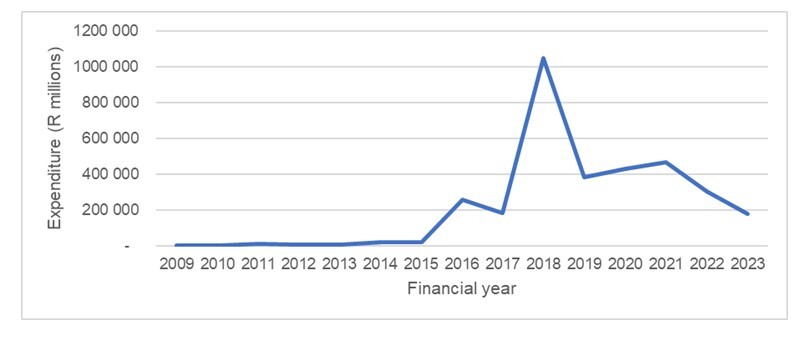Derailed: The tale of Prasa
Johannesburg, 16 February 2024 - An efficient, effective and reliable transport and logistics infrastructure is essential for ensuring economic growth. So much so that the Government, in the 2023 Budget, advised of several reforms aimed at improving the performance of the transport sector, which of course includes the transportation of South African citizens to and from work. As such, R53,2 billion was allocated to support the provision of affordable public transport (and a further R59 billion estimated for the following year). Nomvula Masehla, Project Director: Tax at the South African Institute of Chartered Accountants, believes one such area of passenger transportation in need of urgent revival is the passenger rail transportation system.
I think fondly of a time when a younger, less skeptical version of me would catch the train to work with my parents during my school holidays. So reliable was the passenger rail system that a teacher knew without a shadow of a doubt that they would get to work well before the morning assembly bell rang and be back home in time to prepare a warm supper for the family. Oh, but how life has changed since then.
In an attempt to reflect on South Africa’s progress over the past 30 years, President Ramaphosa, during his 2024 State of the Nation Address (SONA), told the story of Tinstwalo – South Africa’s ‘democracy child’, ‘born at the dawn of freedom in 1994’. Ramaphosa’s Tintswalo would not have been born at the time I remember with fondness and would therefore not have a reason to be “hailing” the 07:00 train to the Ikwezi train station with us.
Fast forward to Prasa’s 2010/11 financial year, assuming Tintswalo, like me, enjoyed accompanying her parents to work while on school holiday, she too would be buzzing as she got ready for the day at work with mom or dad.
Hailing a train would however not be an option as there would be no guarantee that they would get to work on time.
Prasa’s dispute with Transnet (a turf war of sorts, with horns butting over pricing of services and access to the rail network) sparked numerous heated discussions. The issue of contention was Shosholoza Meyl (South Africa’s long-distance passenger train service) which was previously owned by Transnet and transferred to Prasa in 2009. Following this transfer, Transnet would no longer physically transport long-distance rail passengers and would focus on the transportation of goods such as iron-ore and coal. It would however provide the rail network required for long-distance passenger rail. This dispute, coupled with unresolved contractual and pricing issues with companies involved in the refurbishment of coaches, resulted in a decline in fleet availability.
These feuds occurred concurrently with a mismanagement of funds, which affected the maintenance of trains and as a result, train punctuality. The effect of all this was a decline in the total number of passenger trips (Figure 1) and customer satisfaction; passenger rail was perceived by customers as an unreliable mode of public transportation. These events resulted in a 25,6% decrease in annual fare-paying passenger trips during the 2010/11 financial year (with passenger trips dropping from 634 million to 472 million). Customer satisfaction ratings during this period dropped from 75,4% to 71,5% (a 5,1% decrease).
Figure 1: Annual rail passenger trips (millions) (2009 – 2023 FY)

It appeared as though Prasa had learned from the error of its ways, with increased passenger trips from the 2011/12 financial year to 2014/15. The 2011/12 financial year saw passenger trips increasing by 10,7% and remaining steady, with year-on-year increases of just under two percent until the beginning of the 2014/15 financial year.
Trends in customer satisfaction ratings unfortunately did not mirror those of passenger trips, with the 2011/12 financial year only seeing an increase of less than one percent. The 2012/13 ratings decreased by nine percent and subsequently increased by six percent in the 2013/14 financial year, closing off at 69,3%.
With increased passenger trips and the recovery of customer satisfaction ratings, one would have rightly hoped that passenger rail was on track to regaining its status as a reliable mode of transportation.
And then as luck would have it, the train went off the tracks…
The 2014/15 financial year’s dip in customer satisfaction ratings could perhaps have been a forewarning of darker times looming. Rolling stock and infrastructure failures, stations and station facilities in a state of disrepair, theft and vandalism of operating assets and the introduction of bus rapid rail systems, amongst other things, led to a decline in passenger trips (with former Prasa passengers opting for alternative modes of transportation).
The period spanning the 2014/15 up to and including the 2019/20 financial years saw decreases in passenger trips ranging between 5% and 36,4%.
The tale of Prasa’s demise would have been less grim had funds been better managed. The extent of fruitless and wasteful expenditure (Figure 2) speaks to a mismanagement of funds that needed urgent intervention (as funds could have rather been allocated to maintaining and repairing infrastructure and facilities as well as effectively combating theft and vandalism).
Given that this mismanagement occurred against the backdrop of an era when corruption was the flavour of the day, it is no wonder that those responsible for this mismanagement were allowed to run amok.
Figure 2: Fruitless and wasteful expenditure (millions) (2009 – 2023 FY)

The re-introduction of service lines from the 2020/21 financial year is something to be commended.
Had this been coupled with increased spending on quality repairs and maintenance, adequate security to effectively combat any vandalism or theft and the abolishing of fruitless and wasteful expenditure, Prasa would have, barring the impacts of acts of God, made significant strides towards gaining a reputation as a reliable service provider.
This could have led to Tinstwalo benefiting from a reliable passenger rail system. Given the current cost of filling up a tank, it is likely to be an opportunity she would have jumped at. I guess only time will tell whether Tinstwalo will ever know what a reliable passenger rail system looks like.
The increases in the price of fuel makes the provision of affordable public transport that much more pressing. But affordability needs to be coupled with reliability. Given Prasa’s shortcomings as relates to improving the reliability of the passenger rail system, the question begs whether the 2024 Budget will see significant increases in public transport allocations.
SAICA Media Contacts
Kgauhelo Dioka, ***@saica.co.za
Project Manager: Communications
SAICA Brand Division
Renette Human, ***@saica.co.za
Project Director: Communications
SAICA Brand Division
